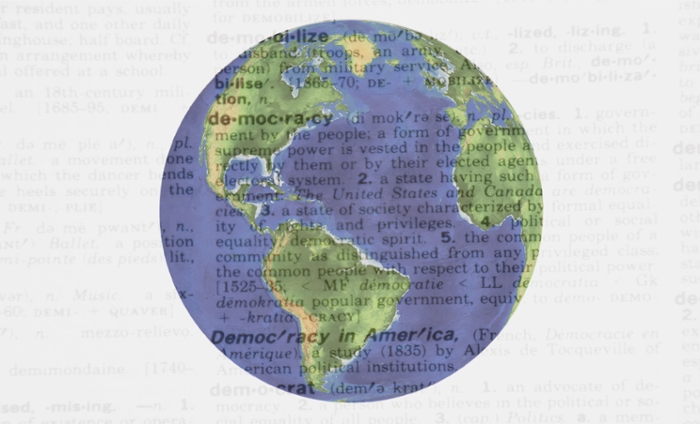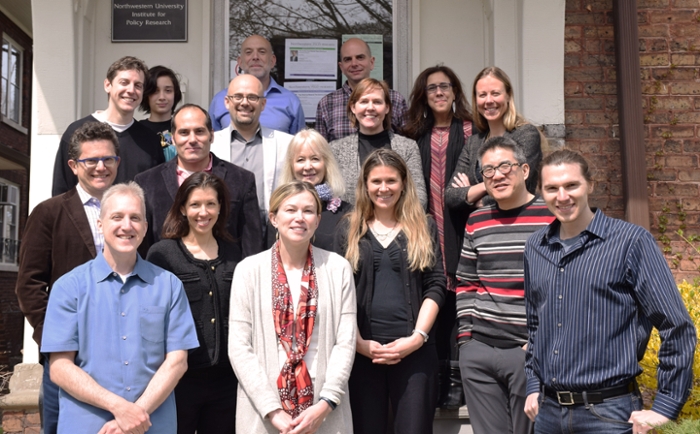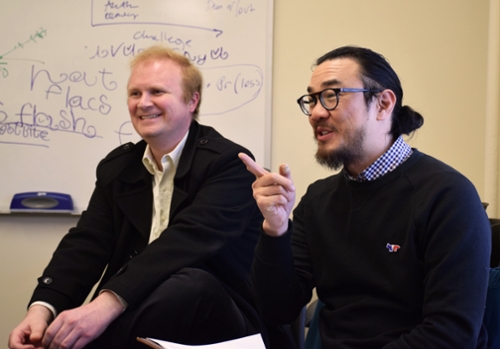A Moment of 'Democratic Imperative'?
Leading scholars debate democracy and regime change at Northwestern workshop
Get all our news
he question of democracy and regime change is such a globally relevant policy question”
Rachel Beatty Riedl
IPR political scientist

Workshop participants discussed how historical cases of democratic change can inform the contemporary moment.
When and why do governments become less authoritarian? Why have some countries, such as Syria, moved from authoritarianism toward instability, while others, such as Nigeria, have become more democratic? Are democracies in the United States and Western Europe headed for breakdown?
These were some of the overarching questions discussed at “The Democratic Change Research Initiative: Global Trajectories and Policy Analysis,” an April 12 workshop led by IPR political scientist Rachel Beatty Riedl and co-sponsored by IPR and the Buffett Institute for Global Studies.
“The question of democracy and regime change is such a globally relevant policy question,” Riedl said. “We brought together scholars who are working on historical cases in Europe and across Africa, Asia, and Latin America to help us better understand these global trends.”
Throughout the day, panelists from Oxford, Harvard, Princeton, Stanford, and Gothenburg, in addition to Northwestern and other universities, covered panels on “Authoritarian-Led Democratization,” “New Perspectives on Democratization and Policy Implications,” “Democratic Breakdown Revisited,” and “The U.S. and Western Europe in Comparative Context: Autocratic Resurgence?”
Do Authoritarians Seek Democracy?
A number of political theories set out to explain why authoritarian countries democratize, or move toward a more democratic form of government.

such as Oxford, Harvard, Stanford, and Gothenburg.
Existing arguments assume that dictatorships give way to democracies due to rising pressures they cannot control, which weaken the regime and force democratic reforms.
At the first panel of the conference, however, Riedl and her co-authors presented an alternative theory: Authoritarian parties sometimes actively pursue democratization.
They find that in both historical and contemporary cases, authoritarian parties in power have liberalized to increase their own popularity, such as by showing responsiveness to constituents, controlling elite factions within their own party, or responding to international “carrots and sticks.” These strategic moves can serve as a catalyst for longer-lasting democratization.
“The key insight is that it can be in the short- and medium-term interest of an authoritarian party to implement these liberalizing reforms,” Riedl noted. “And authoritarians can actually lay the groundwork for stable democracy.”
Policy Implications of Democratization Theories
What are the policy implications of this alternative theory of authoritarian-led democratization?
“Conventional wisdom suggests that in order to fully democratize, you have to take away power of the authoritarian,” Riedl explained. “But that’s not necessarily the best approach, and certainly not the only approach.”
While domestic and international actors usually focus on removing authoritarians, work by Riedl and others at the workshop suggests that “authoritarian incumbents can be an important partner in the transformation itself.”
“Policy inputs should focus on the carrots and sticks that would create incentives for authoritarians to liberalize” rather than seeking to rid the system of authoritarian leaders, Riedl explained.
Participants at the workshop also highlighted another policy implication, one that applies to the United States today.
As right-wing political parties become increasingly fractured and dysfunctional—a phenomenon seen in the United States and across Europe—people often assume that left-wing parties will benefit. But this is not necessarily the case. Using historical cases, the workshop participants discussed how fractured parties on the right can lead to greater overall instability, rather than a consolidation of power on the left.
“These parallels coming from other regions are important for understanding the current moment,” Riedl noted, such as understanding how the splintering of the U.S. Republican Party might lead to greater instability and less institutionalized political parties.
Democratic Breakdown in the West?
While a large body of research studies pathways to democracy, history has shown that the reverse can be true: Democracies can—and do—break down.
What are the forces that move regimes from democracy to instability, or even to authoritarianism?
During the workshop, researchers used case studies from regions such as the Middle East and Latin America to highlight one relevant factor—populism.
Historical cases presented during the workshop—such as the case of Venezuela under Hugo Chavez discussed by Northwestern political scientist Jason Seawright—show how populist movements can erode democracy.

and IPR sociologist Anthony Chen
“Countries that we thought of as consolidated democracies are facing threatening populist actors,” noted Seawright. “Should we be concerned about democratic breakdown in these core countries?”
In addition to Seawright, Harvard’s Daniel Ziblatt continued discussion of the possibility that authoritarianism could resurge in the “consolidated democracies” of the United States and Western Europe in a panel chaired by IPR political scientist Daniel Galvin.
Ziblatt pointed to a number of “road signs” that indicate a country might be heading toward authoritarianism. The signs include the election of an authoritarian leader, the failure of institutions to constrain such a leader, and how effectively citizens can oppose one. IPR sociologist Anthony Chen also discussed how the election of President Trump and populist movements in the United States might fit into a wider global story.
The workshop ended with the larger question of whether we are living in a moment of authoritarian resurgence in the democratic West. Riedl said that the participating scholars planned to continue their investigations into this and other workshop topics, possibly in a special journal issue and also through collaboration with USAID on its Democracy, Human Rights, and Governance (DRG) Strategy.
Rachel Beatty Riedl is associate professor of political science and an IPR fellow. The workshop was jointly sponsored by Northwestern University’s Institute for Policy Research, the Buffett Institute for Global Studies, and the Department of Political Science.
Published: May 1, 2017.